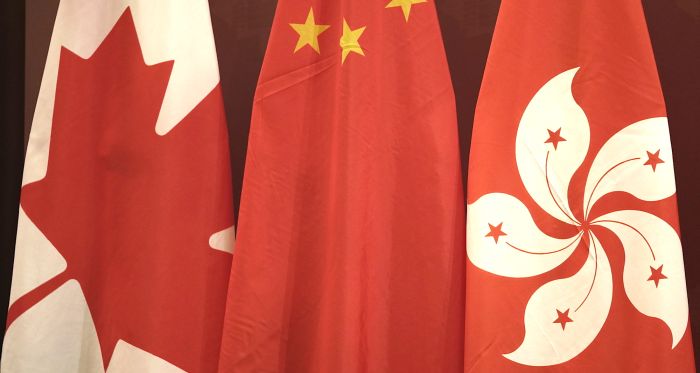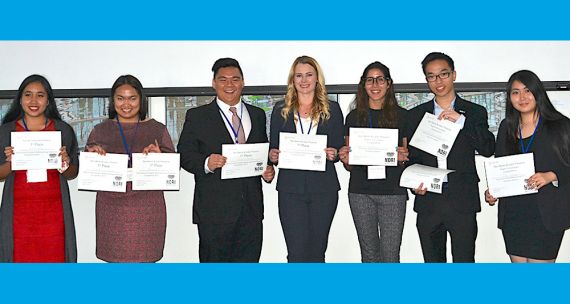The Asia Business Leaders Advisory Council (ABLAC 2019) met on February 27, 2019 in Hong Kong SAR. An initiative of the Asia Pacific Foundation of Canada, this was the fourth meeting of ABLAC, and its first outside Canada. The discussions centred around diversification of Canada’s economic engagement with Asia and differentiating itself in the region, opportunities and challenges for Canadian businesses in Asian emerging markets, and connecting knowledge-based economies across the Pacific.
These topics and the discussions that surrounded them are timely and relevant for youth across Canada. A conversation needs to happen in Canada so that all youth are aware of the opportunities – and challenges – Asia represents so that they can begin engaging today in what will become tomorrow’s most important economic region. As a youth myself, I am grateful that I was able to attend the conference and see that first hand.
What is Asia competence, and why is it important?
Council members from Asia and Canada at the conference discussed the need for more youth to begin engaging with the Asia Pacific and develop Asia competencies, or the skills and knowledge to succeed in a global economy pivoted to Asia. In my experience, a large portion of Canada’s youth is only vaguely aware of Asia’s rising importance in the world. What I don’t see happening among youth is a widespread conversation on the specifics of Asia’s importance including if, why, or how, they can prepare to seize the opportunities and address the challenges that are emerging.
To build the competencies required for a sufficient number of youths to fully engage with Asia, a concerted effort will be required. As a university student I had many peers who studied, travelled, and worked abroad. But of all my peers, I don’t know of any that went to or even considered going to Asia during their education. I suspect that this is because they were never made aware of the value of building Asia competencies or the diverse opportunities available.
Asia can initially seem more distant and difficult to engage with compared to Europe, South America, and other parts of North America. Youth should know that there is much to be gained from building Asia competencies, a broad array of destinations and opportunities available, and Asia can be as easy or easier to engage with than other regions. If you develop any language skills, cultural awareness, regional knowledge, or a network in Asia Pacific countries, you will be well-situated to add and receive value working in both public and private organizations.
The significance of Asia to the future of Canadian employment
The Innovation Superclusters Initiative, co-funded by the Government of Canada and industry to build hubs like Silicon Valley for different industries and make Canada more globally competitive, was discussed at ABLAC – including how they will be a catalyst for increased global engagement. If you are a youth thinking about a career related to one of the superclusters, consider developing Asia competencies alongside traditional career skills. Begin asking what it would mean to be globally competitive in your field and how internships, study abroad, and similar activities in the Asia Pacific could set you up for success. There are companies, universities and specific people with relevant knowledge, and other opportunities across the Asia Pacific that you can connect with to gain the best skills, newest knowledge, or widest network, to propel your career.
ABLAC 2019 recognized the importance of engaging youth and preparing them for the future. It is important to also recognize that youth includes people from many backgrounds, with different interests and values. Indigenous youth should be aware that now is an excellent time for Indigenous people to enter the global economy on a larger scale, especially in Asia. Increasing attention in Canada and around the world to Indigenous issues, including recent change to laws, policies, and norms, is making it easier to engage globally. For example, the recently ratified United States Mexico Canada Agreement includes clauses that state that no country in the agreement can engage in trade activities that would interfere with their obligations to Indigenous people and allow some Indigenous goods to be duty-free.
Better connecting Indigenous Canadians to opportunities in Asia
‘Brand Canada’ refers to how Canada is perceived around the world. ABLAC 2019 discussed how Canada’s brand is strong and can be used to pursue Canada-Asia Pacific engagement by communicating Canada’s value including, for example, having a strong rule of law and stable financial climate. Members also pointed out that despite being strong, ‘Brand Canada’ is not as cohesive as one might initially think. Asian businesses are often confused when dealing with multiple levels of government, trade offices, and representatives. As Indigenous Canadians become more interested in global opportunities and nations partner to represent themselves on the global stage, there may be additional brand challenges but also opportunities.
Indigenous youth must begin thinking about how they want to represent themselves as the future becomes increasingly global. I encourage Indigenous youth to understand and explore the idea that Indigenous peoples are autonomous nations with their own resources, voices, legal claims, and interests within Canada. Working together with the rest of Canada and within the context of ‘Brand Canada’ is possible and could have many benefits. I do not know how or to what extent Indigenous people should integrate with the Canada brand in the best interest of Canada and Indigenous people. I do know that ABLAC is providing an excellent venue to have these discussions. As an Indigenous youth, I am optimistic that ABLAC and the rest of Canada will continue propelling the ideas and momentum required to address such strategic considerations.





